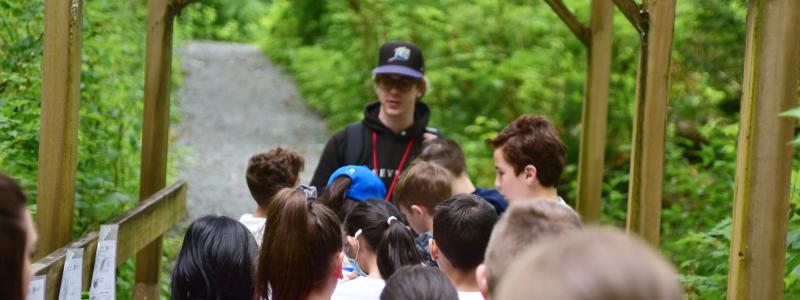This spring and summer, over 3,000 young learners are cycling through the classrooms, science labs, and outdoor learning spaces at TWU. They are among the many elementary students who have come to TWU to experience Salmon in the Valley and Science in the Valley programs.
Taught by TWU students and instructors, these science-focused programs are continuing to create memorable educational adventures and positive community connections throughout the Lower Mainland, as they have been for almost 20 years.
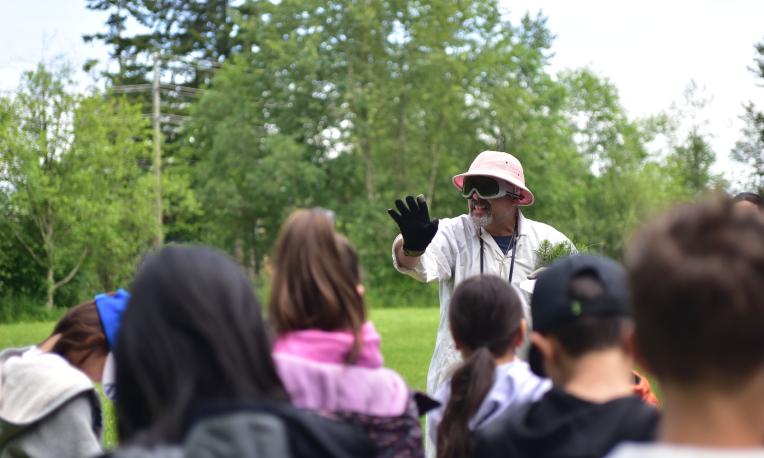
Ecosystem adventures at TWU
Gathered in the recreation field at the southeastern edge of campus are a group of grade 4 students, getting ready to enter TWU’s ecosystem study area for a day of learning. Just as the teaching assistants are handing out clipboards to each student, the group is interrupted by a boisterous guest wearing a lab coat and a pink safari hat.
It is “Professor What-a-nut” who’s come to welcome the class and introduce the rules of visiting the forest in a fun and learner-friendly style.
The students smile and giggle as Professor What-a-nut, played by Christopher Hall, TWU Land Manager and Instructor, kicks off the class’ adventure at TWU.
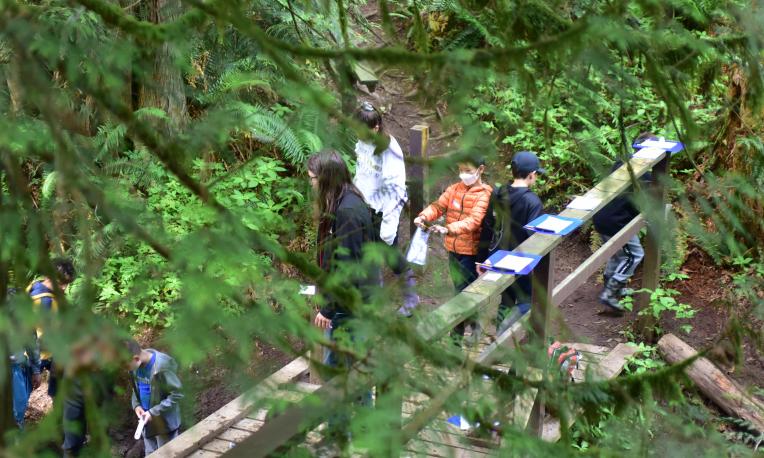
Salmon in the Valley returns
The adventure of the day is Salmon in the Valley. The program was started almost 20 years ago (in 2005) by Christopher Hall and several TWU students, and it is tailored to match the BC Ministry of Education’s curriculum-prescribed learning outcomes for grades 3 and 4.
Salmon in the Valley welcomes students from across the Lower Mainland, including kids from inner city schools and underprivileged schools.
Over the past many years, the popularity of Salmon in the Valley has soared. After a two-year hiatus due to COVID-19, students and teachers were eager for the program's return. All six-and-a-half weeks of this year’s programming booked up almost immediately and attracted a waitlist.
Salmon in the Valley welcomes students from across the Lower Mainland, including kids from inner city schools and underprivileged schools.
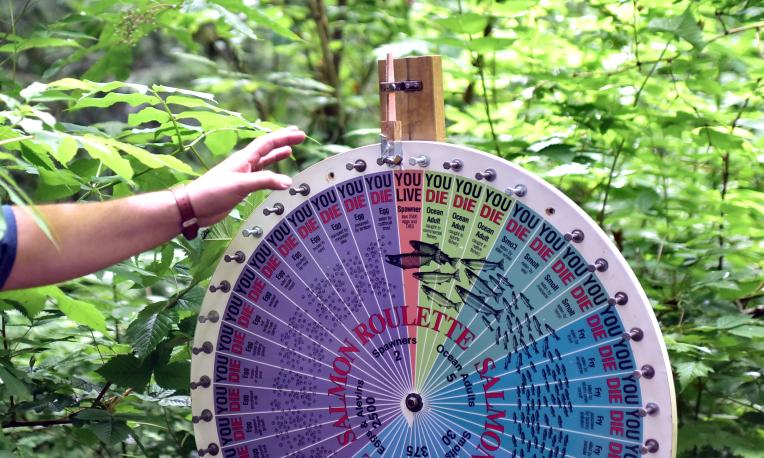
Christopher considers Salmon in the Valley one of the highlights of his work at TWU. It brings him joy to be out in the natural environment of TWU’s Ecosystem Study Area (ESA) and hosting the roughly one thousand students, teachers, and parents who come through Salmon in the Valley sessions every year.
“We get incredible reviews from the community,” Christopher said, “Our teaching assistants (TWU students) are doing an excellent job.”
Trinity Western's ESA consists of 65 acres and includes a lake, forest, and several interconnected natural zones. The Salmon in the Valley program is hosted within a 27-acre forested area on the southside of campus, also known as the Back Forty.
Elementary students participating in Salmon in the Valley get to see, touch, and explore the natural habitat of B.C.’s salmon and local wildlife at TWU's Langley campus. They are challenged to consider ways in which humans can help protect B.C.’s natural resources and support salmon and the local ecosystems to thrive.
All about salmon and their habitat
Elementary students participating in Salmon in the Valley get to see, touch, and explore the natural habitat of B.C.’s salmon and local wildlife at TWU's Langley campus. Through a variety of activities and games, students learn about different species of Pacific salmon living in the wild and how to recognize them. They get their hands and boots wet by venturing into the creek to test water quality and measure pH levels. Finally, they are challenged to consider ways in which humans can help protect B.C.’s natural resources and support salmon and the local ecosystems to thrive.
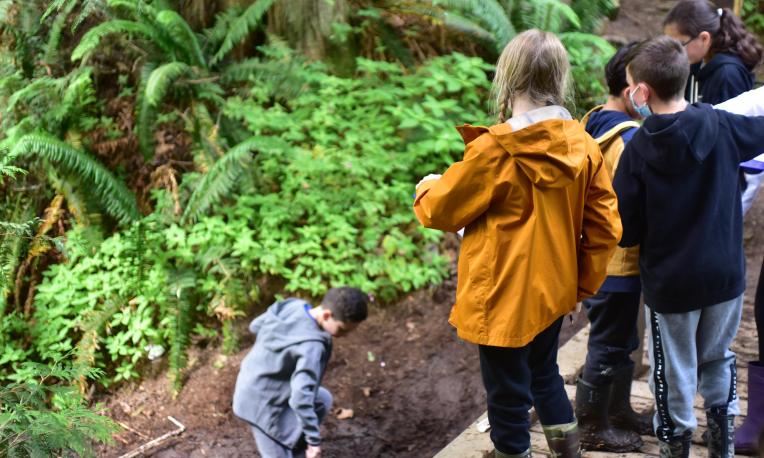
TWU students teach local students
This year’s Salmon in the Valley teaching assistants come from diverse areas of campus and represent multiple fields of study. Christopher emphasizes how the teaching assistants rely on one another’s strengths and expertise and learn from one another as they go about their work in running the program.
Salmon in the Valley teaching assistants come from diverse areas of campus and represent multiple fields of study.
Among this year’s team members is Victor Clements, a former music major whom Christopher describes as having a “cool vibe” and being ready to help others. Victor has experience leading summer camps and sometimes plays music on a recorder to connect with young learners. Teaching assistant Mark Robertson is a religious studies major who hopes to become a youth pastor. Mark’s colleague Ruth is a biotechnology major with a business concentration. Christopher describes Ruth as the “resident biology specialist” who is adept at answering questions that students might have about wildlife and ecology.
Teaching assistant Courtney Warkentin is an education major who looks forward to becoming an elementary school teacher. She tested her class management skills while teaching Salmon in the Valley.
Courtney appreciated the chance to gain outdoor education experience that can apply towards her future teaching career. She also enjoyed the freedom that teaching assistants had to explore their own teaching style. “[We’re able] to deliver the curriculum in the way we're most comfortable with and have the opportunity for creativity and new ideas,” she said.
Thinking of her fellow teaching assistants, Courtney adds, “I could not have asked for a better group of people to work with! They made work fun, and we worked well together as a team.”
Salmon in the Valley is supported in part by funding from the Salmon River Enhancement Society and Aldergrove Credit Union.
See also — TWU researchers investigate knotweed infestations resulting from the 2021 B.C. floods
TWU News
About Trinity Western University
Founded in 1962, Trinity Western University is Canada’s premier global Christian liberal arts university. We are dedicated to equipping students to discover meaningful connections between career, life, and the needs of the world. Drawing upon the riches of the Christian tradition, seeking to unite faith and reason through teaching and scholarship, Trinity Western University is a degree-granting research institution offering liberal arts and sciences as well as professional schools in business, nursing, education, human kinetics, graduate studies, and arts, media, and culture. It has four campuses and locations: Langley, Richmond-Lansdowne, Richmond-Minoru, and Ottawa. Learn more at www.twu.ca or follow us on Twitter @TrinityWestern, on Facebook and LinkedIn.
For media inquiries, please contact: media@twu.ca.
The views expressed by students and alumni are their own. They do not necessarily represent the views of Trinity Western University or of any other companies, groups or organizations named.

